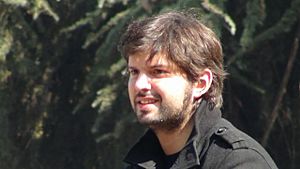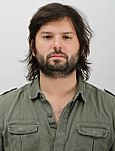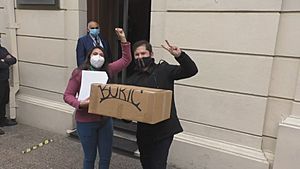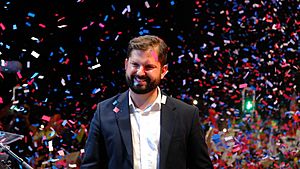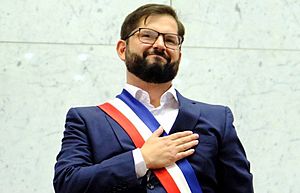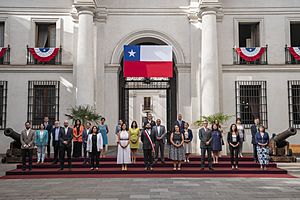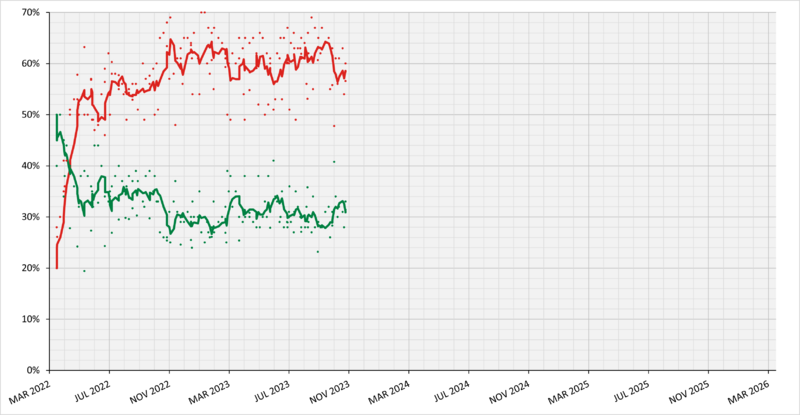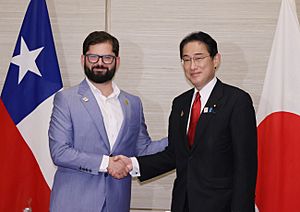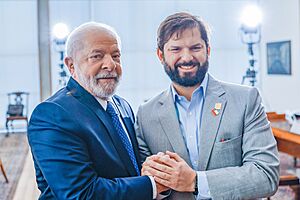Gabriel Boric facts for kids
Quick facts for kids
Gabriel Boric
|
|
|---|---|
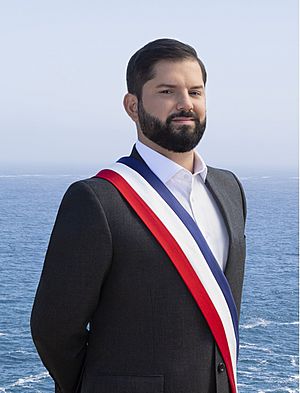
Official portrait, 2022
|
|
| 37th President of Chile | |
| Assumed office 11 March 2022 |
|
| Preceded by | Sebastián Piñera |
| Member of the Chamber of Deputies from Magallanes |
|
| In office 11 March 2018 – 11 March 2022 |
|
| Preceded by | District established |
| Succeeded by | Javiera Morales |
| Constituency | District 28 |
| In office 11 March 2014 – 11 March 2018 |
|
| Preceded by | Miodrag Marinović |
| Succeeded by | District suppressed |
| Constituency | 60th district |
| President of the University of Chile Student Federation | |
| In office 19 December 2011 – 28 November 2012 |
|
| Preceded by | Camila Vallejo |
| Succeeded by | Andrés Fielbaum |
| Personal details | |
| Born |
Gabriel Borić Font
11 February 1986 Punta Arenas, Magallanes y la Antártica Chilena Region, Chile |
| Political party | Social Convergence (2018–2024) Broad Front (2024–present) |
| Other political affiliations |
Autonomous Left (2008–2016) Autonomist Movement (2016–2018) Broad Front (2017–2024) Apruebo Dignidad (2021–2023) Government Alliance (2022–present) Unity for Chile (2023) |
| Domestic partners | Irina Karamanos (2019–2023) Paula Carrasco (2024–present) |
| Children | 1 |
| Relatives | Vladimiro Boric Crnosija (grand-uncle) |
| Education | University of Chile (did not graduate) |
| Signature |  |
Gabriel Boric Font, born on February 11, 1986, is a Chilean politician. He has been the 37th president of Chile since 2022. Before becoming president, he served as a member of the Chamber of Deputies for two terms, from 2014 to 2022.
Boric first became known as a student leader while studying law at the University of Chile. He led the university's student federation during major student protests in 2011. He was first elected to the Chamber of Deputies in 2013 as an independent candidate. He was re-elected in 2017 as part of the Broad Front coalition. In 2018, he helped create the Social Convergence political party. During the large social protests in Chile from 2019 to 2021, Boric played a role in reaching an agreement. This agreement led to a vote in October 2020 on creating a new constitution for the country.
In December 2021, Boric won the presidency in the election. He defeated José Antonio Kast in the second round with 55.9% of the votes. When he took office, Gabriel Boric became the youngest president in Chile's history. He was also one of the youngest serving heads of state in the world at that time.
Contents
Who is Gabriel Boric?
Early Life and Education
Family Background
Gabriel Boric was born in Punta Arenas in 1986. His father's family comes from Croatia, with roots on an island called Ugljan. His great-grandfather, Juan Boric, came to Punta Arenas around 1885. He was one of the first Croats to settle in the Magallanes Region. Gabriel's grandfather, Luis Boric Crnosija, was born in Chile in 1908.
Gabriel Boric's father, Luis Boric Scarpa, is a chemical engineer. He worked for a government oil company for over 40 years. His mother, María Soledad Font Aguilera, has Catalan family roots. Gabriel has two brothers, Simón and Tomás. His granduncle, Vladimiro Boric, became the first bishop of Punta Arenas. Another granduncle, Roque Scarpa Martinich, was the first leader of the Magallanes Region after a period of military rule.
School and University Years
Boric went to The British School in his hometown. In 2004, he moved to Santiago to study law at the University of Chile. He finished his courses in 2009 and became the president of the Law School students' union. He later decided not to become a lawyer and instead wanted to be a writer.
During his time at university, Boric worked as an assistant for Professor José Zalaquett. Professor Zalaquett taught a course on human rights. He praised Boric for always asking questions and thinking deeply.
Journey into Politics
Student Leadership
In 1999 and 2000, Boric helped restart the Federation of Secondary School Students in Punta Arenas. At university, he joined a political group called Autonomous Left. In 2008, he advised the Law Department's Students' Union. In 2009, he became its president. He led a 44-day protest against the dean. From 2010 to 2012, Boric was a university senator, representing students.
Boric ran for president of the University of Chile Student Federation (FECh) in December 2011. He won with 30.52% of the votes, beating the previous president, Camila Vallejo. As FECh president, Boric was a key spokesperson during the student protests that began in 2011. In 2012, he was named one of Chile's 100 young leaders.
Serving in Congress
Boric ran in the 2013 parliamentary elections as an independent candidate for District 60. He won with 15,418 votes, which was 26.2%. This was a big win because he was elected without being part of a major political group. On March 11, 2014, Boric became a member of the Chamber of Deputies.
During his first term, Boric worked on commissions for Human Rights, Extreme Zones, and Labour. He was part of a group of young deputies called the "student bench." They were important in discussions about education reforms. Boric became very popular in Chile.
In 2016, his political group, Autonomous Left, split up. Boric and his allies formed the Autonomist Movement. They wanted to work with other groups to create a new leftist coalition. This movement had good results, like when Jorge Sharp, a friend of Boric, was elected mayor of Valparaíso in 2016.
In January 2017, Boric's movement joined with other groups to form the Chilean Broad Front. Boric helped with Beatriz Sánchez's presidential campaign in 2017. He was re-elected as a deputy in 2017 with even more votes. He continued to work on important commissions in Congress. In 2018, the Autonomist Movement merged with other groups to form the Social Convergence political party.
Role in Social Movements
On October 18, 2019, protests began in Santiago over increased public transport fares. These protests grew into a large social movement across the country. People demanded changes related to the cost of living, government transparency, and fairness.
Boric spoke out against the government's response to the protests. He opposed using the military to control the situation. He also supported legal action against the Interior Minister, Andrés Chadwick, who was found responsible for failing to protect human rights during the protests.
Despite criticizing the government, Boric worked with other political groups to find solutions. He helped create an agreement that led to the idea of writing a new Constitution. This agreement was signed on November 15, 2019. Boric signed it as an individual, which caused some disagreements within his own party.
Presidential Campaign
In 2020, the COVID-19 pandemic caused more tension between the government and citizens. The pandemic also brought together different left-wing opposition groups. In October 2020, 78% of voters supported drafting a new Constitution. This led to discussions about forming a united opposition for the 2021 elections.
Gabriel Boric pushed for all parties to work together. The Broad Front and another alliance called Apruebo Dignidad agreed to form a joint list. This list became a strong force in the Constitutional Convention.
Daniel Jadue, a Communist mayor, was initially the favorite candidate for the left's presidential nomination. The Broad Front's first choice, Beatriz Sánchez, decided not to run. Boric, who was 35 years old, then became an option to run against Jadue in a primary election. His party, Social Convergence, quickly gathered the necessary signatures for him to become a candidate.
Against expectations, Boric won the Apruebo Dignidad primary election on July 19, 2021. He received 60.4% of the votes. After his victory, Boric announced he would work with Jadue to present a united front in the general election.
In the first round of the election on November 21, 2021, Boric came in second with 25.82% of the vote, behind José Antonio Kast. In the second round on December 19, 2021, Boric won with 55.85% of the vote. His inauguration as president took place on March 11, 2022.
President of Chile (2022–Present)
Forming a Government Team
In January 2022, President Boric announced his cabinet, which is his team of ministers. It included members from different political groups and independent individuals. Fourteen of the 24 ministers were women, making it the first cabinet in the Americas with more women than men. The cabinet also included Chile's first openly LGBT ministers, Alexandra Benado and Marco Antonio Ávila. Maya Fernández, the granddaughter of former president Salvador Allende, also joined the cabinet.
Boric also appointed three former student leaders to his cabinet: Camila Vallejo became the government spokesperson, Giorgio Jackson became the secretary-general of the presidency, and Nicolás Grau became the Minister of Economy. When Mario Marcel was announced as the finance minister, the Santiago Stock Exchange reacted positively.
In August 2023, due to low public approval and concerns about crime and the economy, Boric changed his cabinet for the third time.
| The Boric Cabinet | |||
|---|---|---|---|
| Office | Name | Party | Term |
| President | Gabriel Boric | FA | 11 March 2022– |
| Interior | Izkia Siches | Ind. | 11 March 2022–6 September 2022 |
| Carolina Tohá | PPD | 6 September 2022–4 March 2025 | |
| Álvaro Elizalde | PS | 4 March 2025– | |
| Foreign Affairs | Antonia Urrejola | Ind. | 11 March 2022–10 March 2023 |
| Alberto van Klaveren | Ind. | 10 March 2023– | |
| Defense | Maya Fernández | PS | 11 March 2022–10 March 2025 |
| Adriana Delpiano | PPD | 10 March 2025– | |
| Finance | Mario Marcel | Ind. | 11 March 2022– |
| Gen. Sec. of the Presidency |
Giorgio Jackson | RD | 11 March 2022–6 September 2022 |
| Ana Lya Uriarte | PS | 6 September 2022–19 April 2023 | |
| Álvaro Elizalde | PS | 19 April 2023–4 March 2025 | |
| Macarena Lobos | Ind. | 4 March 2025– | |
| Gen. Sec. of Government |
Camila Vallejo | PCCh | 11 March 2022–23 December 2024 |
| Aisén Etcheverry (act.) | Ind. | 23 December 2024–8 July 2025 | |
| Camila Vallejo | PCCh | 9 July 2025– | |
| Economy | Nicolás Grau | FA | 11 March 2022–21 August 2025 |
| Álvaro García Hurtado | PPD | 21 August 2025– | |
| Social Development |
Jeannette Vega | PPD | 11 March 2022–25 August 2022 |
| Paula Poblete | RD | 25 August 2022–6 September 2022 | |
| Giorgio Jackson | RD | 6 September 2022–11 August 2023 | |
| Javiera Toro | FA | 16 August 2023– | |
| Education | Marco Antonio Ávila | RD | 11 March 2022–15 August 2023 |
| Nicolás Cataldo | PCCh | 16 August 2023– | |
| Justice | Marcela Ríos | CS | 11 March 2022–7 January 2023 |
| Luis Cordero | Ind. | 11 January 2023–17 October 2024 | |
| Jaime Gajardo Falcón | PCCh | 17 October 2024– | |
| Labor | Jeannette Jara | PCCh | 11 March 2022–7 April 2025 |
| Giorgio Boccardo | FA | 7 April 2025– | |
| Public Works | Juan Carlos García | PL | 11 March 2022–10 March 2023 |
| Jessica López | PS | 10 March 2023– | |
| Health | María Begoña Yarza | Ind. | 11 March 2022–6 September 2022 |
| Ximena Aguilera | Ind. | 6 September 2022– | |
| Housing & Urbanism |
Carlos Montes | PS | 11 March 2022– |
| Agriculture | Esteban Valenzuela | FRVS | 11 March 2022– |
| Mining | Marcela Hernando | PR | 11 March 2022–16 August 2023 |
| Aurora Williams | PR | 16 August 2023– | |
| Transport & Telecom |
Juan Carlos Muñoz | Ind. | 11 March 2022– |
| National Assets | Javiera Toro | COM | 11 March 2022–16 August 2023 |
| Marcela Sandoval | FA | 16 August 2023–6 January 2025 | |
| Sebastián Vergara (act.) | PPD | 6 January 2025–9 January 2025 | |
| Francisco Figueroa | FA | 9 January 2025– | |
| Energy | Claudio Huepe | CS | 11 March 2022–6 September 2022 |
| Diego Pardow | FA | 6 September 2022–16 October 2025 | |
| Álvaro García Hurtado | PPD | 16 October 2025– | |
| Environment | Maisa Rojas | Ind. | 11 March 2022– |
| Women | Antonia Orellana | FA | 11 March 2022– |
| Culture & the Arts |
Julieta Brodsky | CS | 11 March 2022–10 March 2023 |
| Jaime de Aguirre | Ind. | 10 March 2023–15 August 2023 | |
| Carolina Arredondo | Ind. | 16 August 2023– | |
| Sports | Alexandra Benado | Ind. | 11 March 2022–10 March 2023 |
| Jaime Pizarro | Ind. | 10 March 2023– | |
| Science, Technology, Knowledge and Innovation |
Flavio Salazar | PCCh | 11 March 2022–6 September 2022 |
| Silvia Díaz | PPD | 6 September 2022–10 March 2023 | |
| Aisén Etcheverry | Ind. | 10 March 2023–22 July 2025 | |
| Aldo Valle | Ind. | 22 July 2025– | |
Key Policies and Challenges
When Boric became president, Chile's inflation rate was very high. In April 2022, he announced a $3.7 billion plan to help the economy. This plan included raising the minimum wage to help people with rising prices. Inflation later decreased significantly under his leadership.
His government also reduced the standard working week to 40 hours, which will happen gradually over five years. They made public healthcare free for the poorest Chileans. The monthly minimum wage was raised to about CLP$500,000. A new tax on mining companies was also passed to support local communities.
In May 2022, Boric decided to send troops to the southern part of the country. This was to address ongoing challenges with indigenous communities. This decision was different from his earlier views.
In September 2022, a new draft constitution was presented. However, it was rejected in a national vote. 62% of people voted against it. Critics felt the draft was too long and too focused on certain political ideas.
Chile's Place in the World

Boric's first international trip as president was to Argentina in April 2022. He met with President Alberto Fernández. Boric stressed the importance of friendship between the two nations. He also supported Argentina's claim over the Falkland Islands.
On September 15, 2022, Boric delayed receiving the new Israeli Ambassador. This was a protest against child casualties during conflicts in the region. This decision caused a diplomatic issue. Chile's Foreign Minister later apologized to Israel, and the ceremony was rescheduled. Boric stated that no one in Chile would be treated unfairly for their beliefs, unless they broke the law.
In January 2025, President Gabriel Boric became the first head of state to visit the South Pole. He was the third head of government to do so.
Public Opinion and Support
Boric started his presidency with a 50% approval rating. After his first 100 days, his approval rating dropped to 32.8%. This was a significant decrease for a Chilean President. By the end of 2022, his approval remained low, around 33%. Many people disapproved of his performance. This was due to rising crime, economic difficulties, and changes in his cabinet. His approval rating fell further to 25% by January 2023. By May 2025, Boric's approval rating had declined to its lowest level of his presidency, falling to 27%.
What Gabriel Boric Believes In
Political Ideas
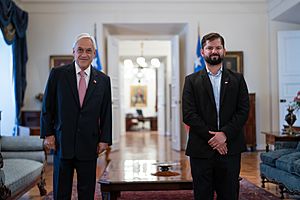
Boric is a left-wing politician. He has been linked to ideas like socialism and social democracy. He once said, "I come from the Chilean libertarian socialist tradition, that is my ideological space of reference. I am a democrat, and I believe that democracy has to change and adapt and not petrify."
He has been described as a leader focused on social justice, human rights, the environment, and gender equality. Boric has criticized the economic system that was put in place in Chile during the military government. He argued that this system continued even after Chile became a democracy again. During his 2021 election campaign, he promised to change this economic model.
After the proposed new constitution was rejected in 2022, Boric adopted a more moderate approach. He has also supported LGBT rights in Chile, advocating for legal recognition of non-binary identities and expanding gender identity laws.
Boric has also discussed ways to improve the prison system. He has criticized ideas that focus only on punishment without solving the root causes of crime. He believes that long-lasting changes must be gradual and supported by many people.
Economic Vision
Boric has criticized the CAE, a student loan program. He believes that education should be a right for everyone, not something people profit from. He promised to forgive student loans and end the program if elected. He also wants to reduce private companies' involvement in important areas.
For healthcare, Boric has called for a universal publicly funded healthcare system, similar to the British National Health Service. He also wants to change the private pension system, suggesting a public system instead. Boric has supported a law for a 40-hour working week and an increase in the minimum wage. He also proposed including workers and women on the boards of large companies.
Since mining is Chile's biggest industry, Boric has suggested creating a state-owned company for lithium extraction. He also wants mining companies to pay more in royalties and to prioritize protecting the environment. Addressing climate change and promoting a green economy are important goals for his presidency.
In March 2023, Boric faced a challenge when his major tax reform proposal was rejected by just one vote in the Chamber of Deputies. This reform aimed to fund his social programs, including changes to the pension system.
Foreign Policy Stances
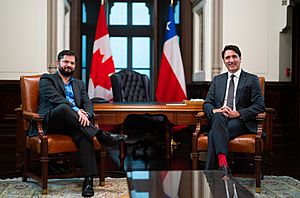
Boric believes that democratic countries should always uphold human rights. He has stated that, just as violations of human rights in Chile's past should be condemned, so should restrictions on freedoms in Cuba, the government in Nicaragua, and the weakening of democracy in Venezuela.
After becoming president, Boric described Venezuela as a failed example, pointing to the millions of Venezuelans who have left the country. He also called the 2021 Nicaraguan election fraudulent.
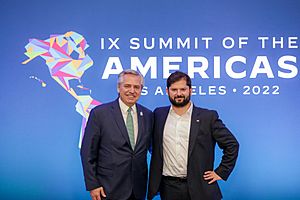
Boric criticized former Brazilian President Jair Bolsonaro for his views on past military rule in Brazil. He called Bolsonaro "a danger to the environment and humanity."
Regarding Bolivia, Boric wants to re-establish diplomatic relations that were broken in 1978. He supports Argentina's position on the Falkland Islands. He also pledged to help Argentina with its debt issues.
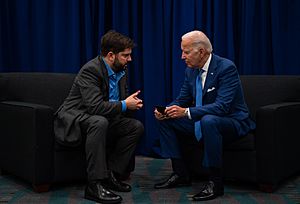
On the topic of the Israeli-occupied territories, Boric has often expressed support for the State of Palestine. In 2019, he called for Israel to return occupied Palestinian territories. He views the Israeli occupation of territories beyond the 1967 borders as a violation of international law.
Personal Details
Family and Interests
Boric has openly discussed his personal experiences with obsessive–compulsive disorder, a health condition he was diagnosed with as a child. He took a break from Congress in 2018 due to this condition. Improving mental health services was a key part of his presidential campaign.
He was raised in a Catholic family, but he now identifies as agnostic. Between 2019 and 2023, he was in a relationship with anthropologist and sociologist Irina Karamanos. During his campaign, Karamanos suggested that the role of the First Lady should be updated. She took on the role and worked to change its traditional duties. In November 2023, Boric and Karamanos announced the end of their relationship.
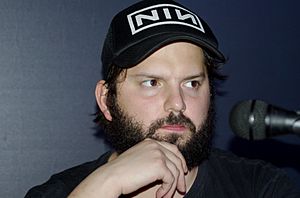
Boric is known for his love of rock and metal music. He often shares posts about his favorite bands like Deftones, Tool, Nine Inch Nails, and Rammstein. He also enjoys music from other genres, including Laura Pausini, Taylor Swift, and Jeongyeon. Boric supports the football team Universidad Católica and plays Magic: the Gathering.
On December 2, 2024, Boric announced on Instagram that he and his partner, Paula Carrasco, were expecting their first child together. Carrasco has a child from a previous relationship. In February 2025, Boric revealed they were expecting a girl. Their daughter, Violeta Boric Carrasco, was born on June 25, 2025. She was the first child born to a sitting Chilean president in 95 years.
Public Image
Boric's appearance and style have been noticed since he became a deputy. As one of the youngest members of Congress, he often wore casual clothes like jeans and t-shirts. He even had a mohawk hairstyle for several months. In 2014, there was a small controversy when he entered Congress without a tie or formal jacket. During his presidential campaign, he adopted a more formal look but still did not wear ties. He is also the first Latin American head of state to have visible tattoos. His tattoos show symbols of his home region, like a map of Magallanes, a lenga tree, and a lighthouse.
Awards and Recognition
National honors
 Grand Master (2022) and Collar of the Order of Merit
Grand Master (2022) and Collar of the Order of Merit Grand Master (2022) and Collar of the Order of Bernardo O'Higgins
Grand Master (2022) and Collar of the Order of Bernardo O'Higgins
International honors
| Ribbon | Distinction | Country | Date | Location | Notes | Reference |
|---|---|---|---|---|---|---|
| Grand Order of King Tomislav | 12 December 2022 | Santiago | Highest civil decoration in Croatia | |||
| Grand Collar of the Order of Boyacá | 9 January 2023 | Santiago | Highest civil decoration in Colombia | |||
| Grand Collar of the Order of the Southern Cross | 7 August 2024 | Santiago | Highest civil decoration in Brazil |
Electoral History
2013 parliamentary elections
2013 parliamentary elections for deputy of District 60 (Río Verde, Antártica, Laguna Blanca, Natales, Cabo de Hornos, Porvenir, Primavera, Punta Arenas, San Gregorio, Timaukel and Torres del Paine)
| Candidate | List | Party | Votes | % | Result |
|---|---|---|---|---|---|
| Gabriel Boric Font | Independent (No list) | IND | 15,417 | 26.18 | Elected |
| Juan Enrique Morano Cornejo | New Majority | PDC | 10,760 | 18.27 | Elected |
| Domingo Rubilar Ruiz | New Majority | PPD | 8,122 | 13.79 | |
| Karim Bianchi Retamales | Independent (No list) | IND | 7,999 | 13.59 | |
| Sandra Amar Mancilla | Alianza | ILJ | 6,581 | 11.18 | |
| Gloria Vilicic Peña | Alianza | RN | 6,541 | 11.11 | |
| Rodrigo Utz Contreras | Independent (No list) | IND | 2,619 | 4.45 | |
| Margarita Novakovic Kalasich | Partido Regionalista de los Independientes | PRI | 545 | 0.93 | |
| Jorge Patricio Ivelic Suárez | Partido Regionalista de los Independientes | PRI | 295 | 0.50 |
2017 parliamentary elections
2017 parliamentary elections for deputy of District 28 (Río Verde, Antártica, Laguna Blanca, Natales, Cabo de Hornos, Porvenir, Primavera, Punta Arenas, San Gregorio, Timaukel and Torres del Paine)
| Candidate | List | Party | Votes | % | Results |
|---|---|---|---|---|---|
| Gabriel Boric Font | Broad Front | IND-PH | 18,626 | 32.82 | Elected |
| Sandra Amar Mancilla | Chile Vamos | IND-UDI | 6,871 | 12.11 | Elected |
| Nicolás Cogler Galindo | Chile Vamos | RN | 4,810 | 8.47 | |
| Juan José Arcos Srdanovic | Chile Vamos | PRI | 4,220 | 7.43 | |
| Karim Bianchi Retamales | The Force of the Majority | IND-PRSD | 4,190 | 7.38 | Elected |
| Vladimiro Mimica Cárcamo | The Force of the Majority | IND-PS | 3,807 | 6.71 |
2021 presidential elections
| Candidate | Party | First round | Second round | |||
|---|---|---|---|---|---|---|
| Votes | % | Votes | % | |||
| Gabriel Boric Font | Apruebo Dignidad (CS) | 1,815,024 | 25.82 | 4,620,890 | 55.87 | |
| José Antonio Kast | Christian Social Front (PLR) | 1,961,779 | 27.91 | 3,650,088 | 44.13 | |
| Franco Parisi | Party of the People | 900,064 | 12.81 | |||
| Sebastián Sichel | Chile Podemos Más | 898,635 | 12.79 | |||
| Yasna Provoste | New Social Pact (PDC) | 815,563 | 11.60 | |||
| Marco Enríquez-Ominami | Progressive Party | 534,383 | 7.60 | |||
| Eduardo Artés | Patriotic Union (PC-AP) | 102,897 | 1.46 | |||
| Total | 7,028,345 | 100.00 | 8,270,978 | 100.00 | ||
| Valid votes | 7,028,345 | 98.79 | 8,270,978 | 98.89 | ||
| Invalid/blank votes | 85,973 | 1.21 | 92,932 | 1.11 | ||
| Total votes | 7,114,318 | 100.00 | 8,363,910 | 100.00 | ||
| Registered voters/turnout | 15,030,974 | 47.33 | 15,030,974 | 55.64 | ||
| Source: Election Certification Court (final first round results), Servel (final second round results) Note: First round: Invalid votes: 55,480 (0.79%), blank votes: 30,493 (0.43%). Second round: Invalid votes: 68,802 (0.82%), blank votes: 24,130 (0.29%). |
||||||
See also
 In Spanish: Gabriel Boric para niños
In Spanish: Gabriel Boric para niños
- Leaders of the 2011 Chilean protests
- Lists of state leaders by age#Youngest serving state leaders
- List of heads of government that have visited the South Pole
- Education in Chile
 | Dorothy Vaughan |
 | Charles Henry Turner |
 | Hildrus Poindexter |
 | Henry Cecil McBay |


